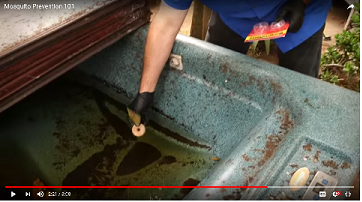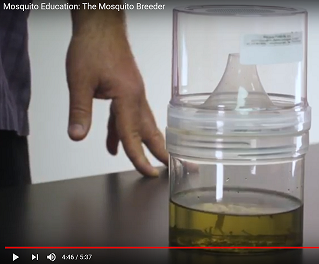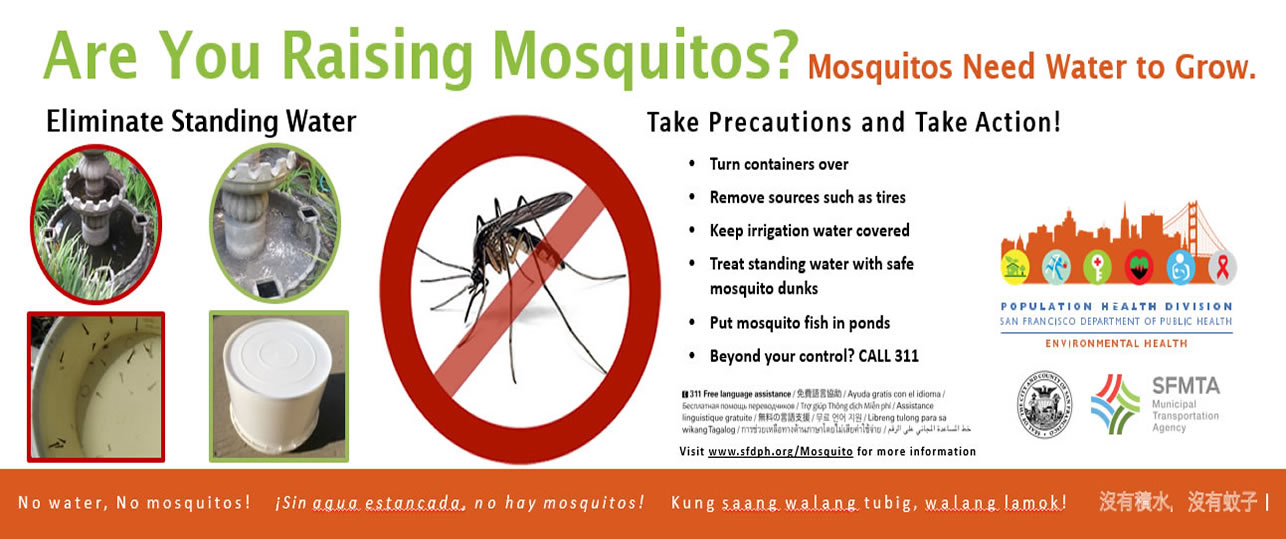- About DPH
- Our Services
- Our Programs
- Healthy Living
- Records, Permits & Licensing
- Knowledge Sharing & Collaboration
- Diseases & Conditions
- Training
Helpful Links
San Francisco Health Code:
Article 1 Section 37
Article 2 Section 92
Article 11 Section 609
Vector Control Rules and Regs (pdf)
Other Websites
CA Mosquito & Vector Control Association
CA Department of Pesticide Regulation
Related Documents
Taking Action Against Mosquitoes (pdf in English)
Related SFDPH Programs
Program Contact
Luisa Garfil
Office: (415) 252-3800
Fax: (415) 252-3930
Email: luisa.garfil@sfdph.org
Mosquito Control
In addition to being a nuisance, mosquitos spread many diseases that affect humans and animals, such as West Nile Virus, dengue and Zika. Fortunately the cool, foggy, windy weather typical of San Francisco keeps mosquito activity relatively low, and our work to eliminate or treat mosquito breeding sources (standing water) with biological or least-toxic larvacides further limits the threat from mosquito-borne diseases.The mosquitos that transmit dengue, chikungunya, and Zika have not been found in San Francisco.
How to prevent mosquitos breeding
Learn how to prevent mosquitos in this short video:

The San Francisco Health Code requires property owners in San Francisco to maintain their properties free of conditions that allow mosquitos to breed.
There are simple and practical steps San Francisco residents can take to prevent West Nile Virus illness. One step is to prevent mosquito breeding and sheltering in your yard. Mosquitoes breed by laying their eggs in standing water. These hatch into larvae (wigglers), and will mature into adult mosquitos in about a week in warm weather. Where possible, residents should:
- Drain all standing water from the property, such as saucers below flower pots, hot tub covers, wading pools, hollow stumps and trash containers. Remove tires and car parts or store them indoors.
- Stock permanent ponds with fish that eat mosquito larvae. Pumps that circulate water are also effective.
- Clean out clogged roof gutters in the spring and fall, and maintain drains clear of leaf litter.
- Cut back overgrown vegetation, especially if it is growing in the shade, and do not over water your yard. Keep grass cut short and let the ground and the soil in potted plants dry on the surface before watering. Keep your ground clear of leaf litter.
- Use non-chemical insecticides such as Bti "dunks" that can be purchased at garden supply stores and used in pools of standing water that cannot be drained.
Using "Mosquito Breeder" in the classroom
Educators can view this video to learn how to use mosquito breeders as a classroom tool:
Contact Nader Shatara to get your free breeder while supplies last.
Preventing mosquito bites
Certain viruses are transmitted by mosquito bites, so preventing mosquito bites is a critical element to preventing disease. Here are some simple ways to protect yourself and your family from bites.
- Screens: make sure that doors and windows have tight fitting screens. Repair or replace those with tears or holes.
- Bed nets: Place mosquito nets over beds and cribs.
- Dawn and dusk: avoid outdoor activity at dawn and dusk. In most areas the mosquito season is from May to October, but in the Bay Area the season may extend almost year round.
- Protective clothing: wear long sleeve shirts and long pants when mosquitos are active.
- Repellents: DEET and permethrin products are most effective but must be used with caution, especially around children.
The US Centers for Disease Control has information on the proper selection and use of EPA-registered insect repellants, including special considerations for young children and pregnant women.
SFDPH Environmental Health Mosquito Control
Mosquito and other vector control issues are investigated by the Healthy Housing & Vector Control Program. Our staff includes state certified vector control specialists trained in mosquito management who can give advice on the control of mosquitos and the use of pesticides.
Healthy Housing inspectors conduct routine inspections of buildings with rental units to make sure that properites and the surrounding areas are not providing environments where mosquitos can live and breed.
Healthy Housing inspectors also respond to complaints of mosquito occurrences and offer assistance to tenants and property owners in identifying and controlling potential and actual breeding sites. Sometimes our staff will install Mosquito Traps.
The Healthy Housing & Vector Control Program also supports other agencies in their mosquito and other vector control efforts, assisting with creating cost-effective strategies for mosquito control and for raising awareness among our citizens of the importance of avoiding mosquito bites. For example, the San Francisco Public Utilities Commission routinely inspects and controls mosquitos breeding in public catch basins. Some key public agencies include:
- San Francisco Public Utilities Commission
- Department of the Environment
- Recreation and Parks Department
- Port
- Department of Public Works
- San Francisco Unified School District
SFDPH Environmental Health Mosquito Control program has received grant support from the State of California to pay for mosquito control technicians, equipment and supplies.
Making a Complaint
The Environmental Health Branch (EHB) certified vector technicians and the City's pest control contractor investigate all reports of mosquito activity. When filing a complaint, please specify if biting is occurring in the daytime or night time or both and whether the biting or mosquitos are observed indoors or outdoors. This information helps us determine what type of mosquito is affecting the area and what the best response should be.
The Environmental Health Branch investigates complaints about standing water and other conditions that may allow mosquito breeding.
For complaints about these issues call or visit 311 to have your complaint recorded and routed correctly to Environmental Health.



